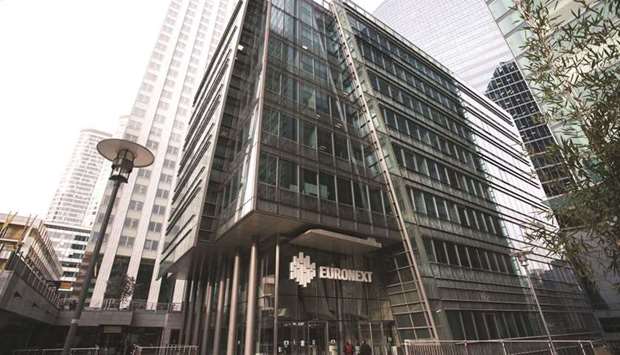Bargain-buying on Friday helped major markets recover some of this week’s steep losses as investors took heart from a forecast-beating US jobless claims report, despite lingering inflation fears, while latest US retail data came in flat.
Oil prices recovered after heavy losses a day earlier to end the week in the black as equities rose and with the dollar losing ground following recent gains.
Bitcoin steadied close to $51,000 after a characteristic plunge.
Global equities have been convulsed for months by expectations that a blockbuster global recovery will send prices rocketing, forcing central banks — particularly the Federal Reserve — to taper the ultra-loose monetary policies that have helped drive a rally for more than a year.
Wall Street had added 0.8% some two hours into trading while major European markets closed around 1% ahead — manufacturers lifting London’s FTSE as BAE Systems and Rolls Royce each scored 3% gains.
While central bank officials have been in no rush to change course, investors have been preparing for what they see as the inevitable, selling firms at risk from higher interest rates, such as in the tech sector, and buying those that benefit.
The scorching inflation narrative was reinforced this week with US consumer prices coming in far above estimates on Wednesday, followed by data Thursday showing the wholesale price index at its highest since comparable records began in 2010.
“This bigger-than-expected rise does suggest that we will probably get another two or three months of high inflation prints,” said CMC Markets analyst Michael Hewson.
For Fawad Razaqzada, market analyst with ThinkMarkets, “There is a sense of calm returning to the market with investors happy to buy the dip in the markets of stocks, especially cyclical.”
He said Fed consensus appeared to be “that inflation is likely to rise somewhat further before moderating later this year.
But I am sure the Fed is secretly getting worried about the situation”. In its April monetary policy minutes published Friday, the European Central Bank agreed not to react too quickly to rising inflation.
ECB governing council “members generally agreed on the importance of looking through the increase in inflation in the short term — which was expected to be temporary — as well as the heightened volatility expected over the coming 12 months,” according to the minutes ECB chief economist Philip Lane said “Underlying price pressures were subdued in the context of weak demand and significant slack in labour and product markets.”
But they were “expected to increase somewhat in 2021 owing to short-term supply constraints and the recovery in domestic demand”, hence “inflation would exhibit some volatility for the remainder of the year”. Wall Street and major European indices both had added around one % shortly after the start of the US session and two hours from the European close while the tech-rich Nasdaq also enjoyed healthy gains.
While most Asian markets recovered some of this week’s steep losses, Singapore slid nearly 3% amid a spike in Covid infections in the city which put an already once-delayed travel bubble with Hong Kong in doubt.
Elsewhere, crude prices bounced after Thursday’s losses of more than 3% aided by a weaker dollar which makes commodities priced in the US currency more attractive.
The pan-European STOXX 600 index rose 1.1%, with oil & gas and retail stocks leading the gains.
The benchmark still fell 0.5% for the week as a rally in commodity prices and signs of quickening US inflation raised fears about an earlier-than-expected interest rate hike by the US Federal Reserve.
However, sentiment improved on the US Federal Reserve’s reassurances on monetary policy, as it also said it would not immediately reduce cash injections that have propped up financial markets. While price rises are less of a problem in the eurozone, investors have taken cues from Wall Street for most of the week.
Analysts, however, say Europe remains an attractive pick for global investors.
“We look at the valuation of markets and the valuations have favoured Europe for a number of years because it is more economically sensitive,” said Jeffrey Germain, investment group director at Brandes Investment Partners.
Sebastian Raedler, investment strategist at BofA Global Research wrote: “We see a further 5% upside for the STOXX 600, as well as 10% further outperformance for cyclicals versus defensives, value versus growth and financials, all of which benefit from both accelerating growth and rising bond yields.”
Separately, Bank of America’s weekly fund flow statistics showed that investors pulled out of tech equity funds and loaded up on inflation protection in the week ended May 12.
Minutes from the European Central Bank’s latest policy meeting showed policymakers set the stage for a June 10 showdown over the future of their emergency bond purchases when they met in April, but stopped short of discussing their next move.
Among individual stocks, Italy’s Banco BPM rose 3% after Deutsche Bank upgraded the stock to “buy”, saying the lender’s “speculative appeal” could increase in the next few months.
French food group Danone slipped 0.3% after Goldman Sachs downgraded the stock to “sell”, saying weaker demographic trends, particularly in China, will weigh on its specialised nutrition business.
Atlantia slipped 0.2% after the Italian infrastructure group reported a net loss in the first quarter and confirmed it would decide on the sale of its stake in motorway unit Autostrade by June 11.
In London, the FTSE 100 closed up 1.2% to 7,043.01 points; Frankfurt — DAX 30 ended up 1.4% to 15,416.16 points; Paris — CAC 40 closed up 1.5% to 6,385.14 points and EURO STOXX 50 ended up 1.6% to 4,016.14 points yesterday.

Europe markets rebound on bargain-buying after inflation-fuelled rout
